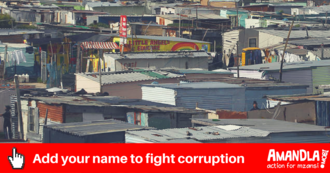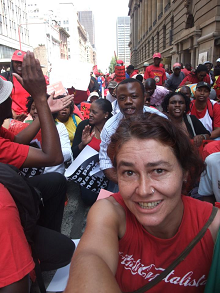- Featured
- Clean air
- Climate justice
- Consumer Rights
- Corporate Accountability
- Data access
- Early Childhood Development
- Economic fairness
- Education
- Electoral fairness
- Environmental justice
- Food justice
- Gender based violence
- Grants/social assistance
- Health
- Housing and infrastructure
- Industry interference
- Land Justice
- LGBTQIA+ rights
- Media/ information access
- Public transport
- Racism
- Reparations
- Safety
- Sanitation
- Service Delivery
- Sexual and Reproductive Rights
- Social justice
- Unemployment
- Womxn's rights/ gender equality
- Workers' rights
- More
-
Fight corruption, demand transparent service delivery in Mamusa Local MunicipalityWe can improve service delivery and fight corruption in our Municipality by ensuring all Service Delivery Agreements (SDAs) are public and easily accessible to all. Some politicians, officials and businesses are scared about transparency, but if they aren't doing anything wrong, what have they got to hide. * This campaign by amandla.mobi is supported by Heinrich Böll Stiftung.4 of 100 SignaturesCreated by Itumeleng molebalwa
-
Fight corruption, demand transparent service delivery in Bojanala Platinum District MunicipalityWe can improve service delivery and fight corruption in our Municipality by ensuring all Service Delivery Agreements (SDAs) are public and easily accessible to all. Some politicians, officials and businesses are scared about transparency, but if they aren't doing anything wrong, what have they got to hide. * This campaign by amandla.mobi is supported by Heinrich Böll Stiftung.6 of 100 SignaturesCreated by Tshiamo Sehunoe
-
Fight corruption, demand transparent service delivery in Msukaligwa Local MunicipalityWe can improve service delivery and fight corruption in our Municipality by ensuring all Service Delivery Agreements (SDAs) are public and easily accessible to all. Some politicians, officials and businesses are scared about transparency, but if they aren't doing anything wrong, what have they got to hide.4 of 100 SignaturesCreated by Bonginkosi Lucky Duba
-
Fight corruption, demand transparent service delivery in uMgungundlovu District MunicipalityWe can improve service delivery and fight corruption in our Municipality by ensuring all Service Delivery Agreements (SDAs) are public and easily accessible to all. Some politicians, officials and businesses are scared about transparency, but if they aren't doing anything wrong, what have they got to hide.7 of 100 SignaturesCreated by Siyabonga Mbanjwa
-
Fight corruption, demand transparent service delivery in AbaQulusi MunicipalityWe can improve service delivery and fight corruption in our Municipality by ensuring all Service Delivery Agreements (SDAs) are public and easily accessible to all. Some politicians, officials and businesses are scared about transparency, but if they aren't doing anything wrong, what have they got to hide.2 of 100 SignaturesCreated by Phumlani Mangethe
-
Fight corruption, demand transparent service delivery in Emalahleni Local MunicipalityWe can improve service delivery and fight corruption in our Municipality by ensuring all Service Delivery Agreements (SDAs) are public and easily accessible to all. Some politicians, officials and businesses are scared about transparency, but if they aren't doing anything wrong, what have they got to hide.29 of 100 SignaturesCreated by Chris Van Rooyen
-
Fight corruption, demand transparent service delivery in Mogale City Local MunicipalityWe can improve service delivery and fight corruption in our Municipality by ensuring all Service Delivery Agreements (SDAs) are public and easily accessible to all. Some politicians, officials and businesses are scared about transparency, but if they aren't doing anything wrong, what have they got to hide.5 of 100 SignaturesCreated by Alan Exton
-
Reinstate Claire Ceruti at the University of JohannesburgIn 2015, we witnessed the most forceful and sustained student movement in the post-apartheid era under the banner of #FeesMustFall closely followed by workers’ #OutsourcingMustFall campaign. In 2016, these campaigns continued. University management across the country responded by securitising campuses leading to violent attacks on protestors, preventing students from walking in groups of more than three and, until this day, searches of students and faculty inside and outside of campuses. Hundreds of student activists have been arrested and suspended throughout South Africa. Claire Ceruti, is a former Ph.D. candidate at the University Johannesburg (UJ), who has been prevented from continuing her studies because she was prominent during the student and worker protests. Claire Ceruti is an author of the award-winning Class in Soweto. Her Ph.D. thesis is a deeply theoretical and exceptionally historically and empirically grounded longitudinal study. Those who have worked with Claire admire her astute scholarship and commentary on a wide range of subjects which include sociology, feminism, collective action, labour studies, Marxism and race and class analysis. She was active in the struggle against apartheid and continues the struggle against neoliberal capitalism. Although we are of the strong view that Claire’s exclusion is politically motivated, the official reason UJ administration gave is that she did not complete her Ph.D. in time. They present the analogy that a sprinter who runs 100 metres in less than 10 seconds doesn’t get a medal and that she was not fast enough in her own “sprint” to complete her Ph.D. This neoliberal market-oriented logic which puts quantity before quality is dangerous since it suggests that if someone invented a cure for cancer in 10 years, their knowledge contribution would be worthless. On Behalf of the South African Sociological Association (SASA). SASA Executive: President: Sonwabile Mnwana Vice-President: Nomkhosi Xulu Gama Secretary: Luke Sinwell Treasurer: Carin Runciman475 of 500 SignaturesCreated by South African Sociological Association (SASA)
-
STOP TAXING OUR PERIODHave you ever wondered about the impact of a woman's period on society? For many women around the globe and in particular our home country South Africa, this is a daily challenge, especially when trying to have access to affordable sanitary wear. At present the majority of women around the world are currently on a menstrual period and there are millions of women who do not have access to this basic necessity, especially our school-going young women, who can ill-afford to miss school during their developing years. Those who can afford sanitary wear, are then subjected to paying tax on acquiring a basic necessity to feel clean and comfortable, during a period. With the escalating price of sanitary towels it would be most welcoming if our government can drop the tax on this very important commodity. In order to grow a self-sustainable country we need to ensure that we create a strong foundation and that is investing in our future generation. The women of our country serve the backbone of our economy and if we cannot ensure their well-being then the cycle of poverty is perpetuated. Please SIGN THE PETITION TO STOP TAXING OUR PERIOD91 of 100 SignaturesCreated by Cecilé-Ann Pearce

-
Release Bonginkosi KhanyileMzansi is a grossly unequal society. The government's efforts at addressing these inequalities leaves much to be desired. "The children of any nation are its future. A country, a movement, a person that does not value its youth and children does not deserve its future." Oliver Tambo5,383 of 6,000 SignaturesCreated by Cynthia Marebane
-
#FeesMustFall National ImbizoOur children have missed the academic year because of the hide and seek the government officials do, the ruling party had promised that we would have Free Quality Education in South Africa to close the gap between the previous disadvantage and the advantage group.112 of 200 SignaturesCreated by Monwabisi Maswana
-
#NotInOurNameUCTUCT management has made it clear that they plan to resume full university functions on Monday 3rd October through the use of extensive private security. Heavy private security has been deployed at other South African universities with serious implications for the safety of students and staff alike. The state’s recent zero tolerance directive to the police force with regard to student protesters shows an increased willingness to use violence to resolve disputes. However there is no strong evidence that increased security will protect students or prevent the destruction of property. In fact experiences over the last year and on other campuses have shown increased security presence escalates tensions and is more likely to lead to violence than to mitigate it. Despite management’s multiple communiques regarding engagements with different stakeholders, a transparent negotiation process between management and protesting students only began in earnest as of this Friday, 30th September. Without a genuine commitment to engaging with tangible outcomes, there is substantial basis to concerns that the opening of campus on Monday 3rd October will dissolve the urgency to deal with issues of fees, interdicts and institutional culture. #NotInOurNameUCT #DenouncePrivateSecurity #EndTheImpasse Ways to show support: We ask that people sign and share the petition in support. For tutor groups, teaching or lab assistants and other students or staff involved in the running of the university, you could send emails to your students and faculties (to denounce use of private security, declare a stay-away or discontinuation of work until these issues are addressed, and pressure your faculty bodies to take a stance on this matter) For different interest groups at UCT, whether student societies or faculty bodies or other, public statements denouncing private security and calling for engagement.2 of 100 SignaturesCreated by Amandla.mobi Member
.png)











